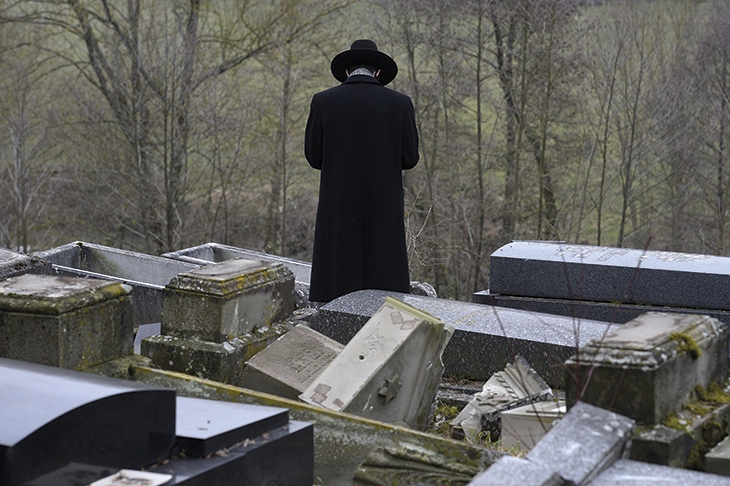Some people might argue that Deborah Lipstadt has given us the book we desperately need from the author best equipped to write it. After all, in just the past few weeks the dumpster fire over the Labour party’s hand-ling of anti-Semitism burst into acrid flame again over general secretary Jenny Formby’s release of Labour’s record in responding to the problem — 673 complaints, 96 members suspended, 12 expelled. Labour’s failure to act decisively against anti-Semitism was also cited by most of the nine MPs who left the party.
Meanwhile, in Lipstadt’s own country, Ilhan Omar, one of two Muslim-American women recently elected to congress, was condemned by House Speaker Nancy Pelosi and the entire Democratic leadership after she tweeted that congressional support for Israel was ‘all about the Benjamins’ — a reference to a song by the rapper Puff Daddy. But it was also, according to her critics, a suggestion, by way of a historic anti-Semitic trope, that US congressional devotion to the Zionist cause owed more to Jewish money and power than to any deeper attachment to the Jewish state or an authentic sense of the American national interest.
These are indeed murky waters, but unlike David Hare and Anthony Julius, whose endorsements adorn the book’s cover, I’m not sure Lipstadt is a reliable guide. A competent scholar whose first book, Beyond Belief, traced American resistance to news of the Holocaust, Lipstadt was catapulted to fame by her heroic defence against David Irving, who sued her for libel over his depiction in her second book, Denying the Holocaust: The Growing Assault on Truth and Memory. (Julius was the architect of that defence, while Lipstadt’s account of her ordeal was brought to the screen in Denial, written by Hare.) However, no one who has read either book would call Lipstadt a subtle thinker.
In Denying the Holocaust she argued that while literary deconstruction, as championed by the critic Stanley Fish and the post-modernism of the philosopher Richard Rorty, may have had ‘something to recommend’ them as ‘an approach to texts’, such relativism ‘created an atmosphere of permissiveness toward questioning the meaning of historical events’, making Holocaust denial harder to refute. Here she performs a similar two-step regarding Israel’s critics, conceding that ‘there is a vast difference between being opposed to the policies of the Israeli government and being an anti-Semite’, but then spending much of the book whittling that distance down.
Palestinians are allowed to complain about discrimination and disenfranchisement — so long as they don’t call it racism. Or resort to armed resistance. Or join the call for Boycott, Divestment and Sanctions (BDS). Jews who question the whole Zionist project, Lipstadt writes,
may not personally be anti-Semites, but they facilitate it. On the other hand, I wouldn’t consider them anti-Semitic. But organisations such as BDS that negate the existence of a Jewish state most definitely are.
Structured as a series of letters between Lipstadt, ‘Abigail’, a fictional ‘whip-smart Jewish student who has taken many of my courses’, and ‘Joe’, an equally fictional non-Jewish professor at Emory’s law school, the narrative satisfies neither as history nor social criticism. Rather than define her subject, Lipstadt offers both a Potter Stewart definition — after the late Supreme Court justice who famously observed, of pornography, ‘I know it when I see it’ — and Isaiah Berlin’s cringing observation that ‘an antiSemite is someone who hates Jews more than absolutely necessary’. Finally she wheels out the International Holocaust Remembrance Alliance’s ‘a certain perception of Jews, which may be expressed as hatred toward Jews’.
Most Jews do recognise anti-Semitism when we see it — whether in a crowd of white frat boys parading through Charlottesville shouting ‘Jews will not replace us’ or the Labour advertisement depicting Michael Howard and Oliver Letwin as pigs or that Sun front page of Ed Miliband choking on a bacon sandwich. Despite Lipstadt’s epistolary labour, hatred of Jews simply for being who we are isn’t complicated, although the history of specifically English variants proved sufficiently rich to bring Anthony Julius’s magisterial Trials of the Diaspora up to 800 pages.
The tricky bit — taking up two ill-tempered chapters in Julius and some even less satisfactory moralising by Lipstadt — is in distinguishing anti-Zionism from anti-Semitism. Perhaps because the expectation of a single standard of justice, which would treat the actions and entitlements of Jews as a people and Israel as a state no different from any other people or state, strikes no one as either desirableor practicable.
Yet anyone in search of guidance on how to tell whether criticisms of Israel or Jews are in good faith will get even less help from Lipstadt than they would from the Labour party. (Readers in a hurry might want to consult the Twitter thread recently posted by Daniel Seidemann, an Israeli lawyer and founder of the Terrestrial Jerusalem website. Those with a bit more time could read Understanding AntiSemitism — an excellent 44-page handbook from the New York-based Jews for Racial and Economic Justice.)
But then Lipstadt’s intended audience may not exist. It’s easy enough to imagine worried Jews buying a copy of her book for their assimilated grandchildren — or as a gift for well-meaning Gentile friends and neighbours. Much harder, though, to believe any of them will ever finish it — or learn anything from it.






Comments